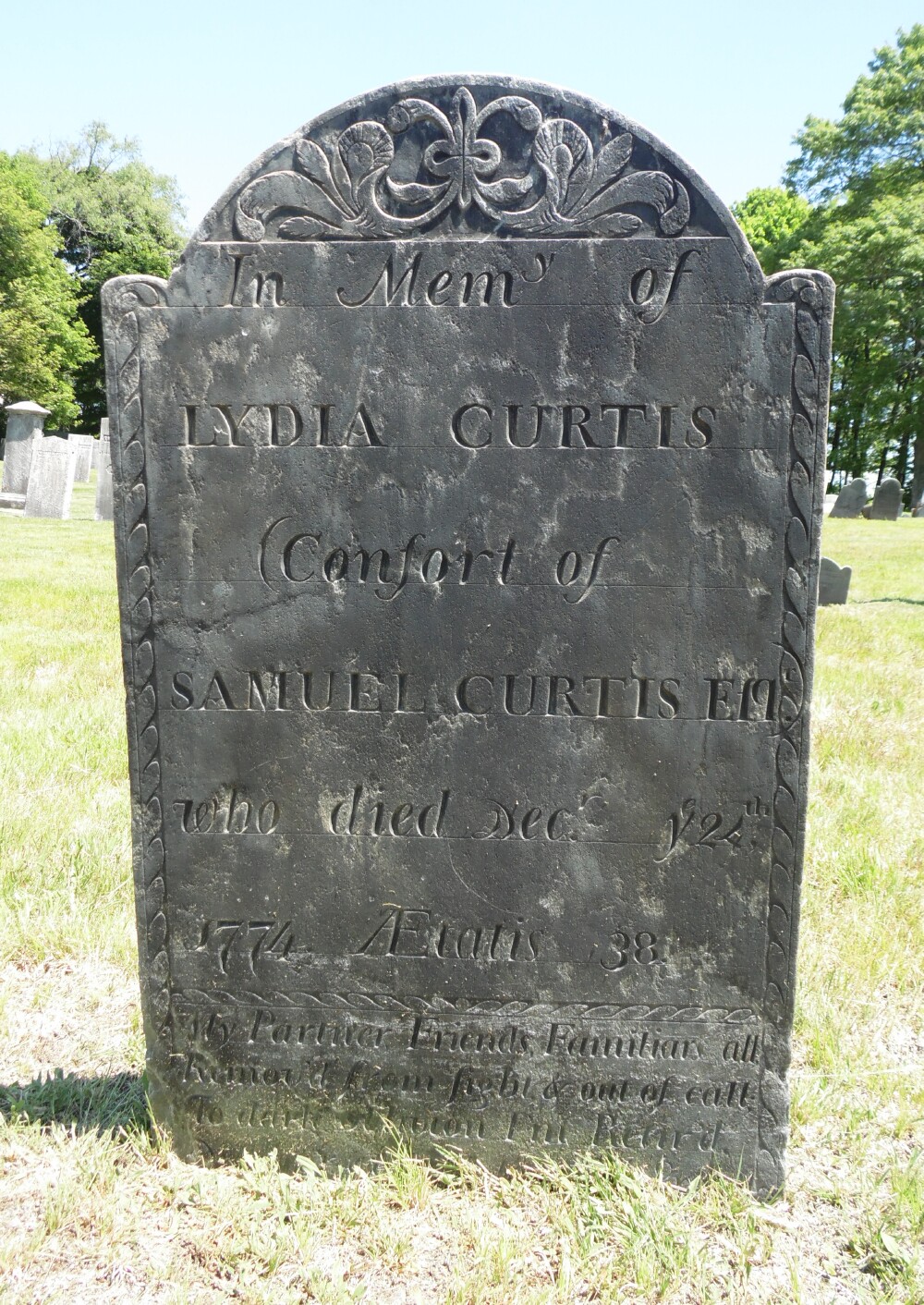The Short Marriage of Dr. Samuel and Lydia Curtis
In March 1769, as I recounted yesterday, Dr. Ebenezer Dexter of Marlborough died. He left a wife, Lydia, and four young sons.
By July a young physician named Samuel Curtis was boarding in the Dexter house, treating the late doctor’s patients.
On 30 June 1771, the widow Lydia Dexter married Dr. Samuel Curtis. The bride was almost eleven years older than the groom.
The new couple’s neighbors wouldn’t have needed medical training to understand their reason for marrying. Their first child, Anna, arrived on 5 October, or three months and one week later.
Those necessary nuptials didn’t stop Dr. Curtis from gaining his neighbors’ respect, however. In 1772 the Marlborough town meeting put him on its committee of correspondence.
Unfortunately, the Curtis marriage didn’t last long. Not because of incompatibility but because of illnesses.
In August 1772 the Dexters’ youngest son, Jason Haven Dexter, died at the age of ten.
In March 1774, Lydia Curtis gave birth to her second child by Samuel, a daughter named Christian. (Was she named after Loyalist neighbor Christian Barnes?) But within one week in December, the Curtises’ first daughter, Anna; their new baby, Christian; and Lydia all died.
Dr. Samuel Curtis was now the widowed stepfather of three teen-aged boys from Lydia’s first marriage. I don’t know how much the doctor was involved in raising them after that, though. He was putting a lot of his energy into Patriot politics, serving on the town’s committee of correspondence and as a representative to the Middlesex County convention in August 1774.
On 1 Mar 1775, when Henry Barnes tried to shelter two British officers on a clandestine scouting mission, Curtis politely pushed himself into the house and quizzed Barnes’s young niece about those family guests. That September, the Massachusetts government appointed the doctor as a justice of the peace.
In March 1777, Dr. Curtis’s Patriotism took a new turn. He enlisted as a surgeon on the Continental Navy ship Hancock under Capt. John Manley. Joseph Ross has provided a long discussion of Dr. Curtis’s adventures in the navy. It doesn’t agree in all details with the profile of Curtis in Sibley’s Harvard Biographies, so I need more time to sort those out.
But I definitely plan to come back to Dr. Samuel Curtis. He seems to have found drama wherever he went, often by making it himself.
TOMORROW: The Dexter boys.
By July a young physician named Samuel Curtis was boarding in the Dexter house, treating the late doctor’s patients.
On 30 June 1771, the widow Lydia Dexter married Dr. Samuel Curtis. The bride was almost eleven years older than the groom.
The new couple’s neighbors wouldn’t have needed medical training to understand their reason for marrying. Their first child, Anna, arrived on 5 October, or three months and one week later.
Those necessary nuptials didn’t stop Dr. Curtis from gaining his neighbors’ respect, however. In 1772 the Marlborough town meeting put him on its committee of correspondence.
Unfortunately, the Curtis marriage didn’t last long. Not because of incompatibility but because of illnesses.
In August 1772 the Dexters’ youngest son, Jason Haven Dexter, died at the age of ten.
In March 1774, Lydia Curtis gave birth to her second child by Samuel, a daughter named Christian. (Was she named after Loyalist neighbor Christian Barnes?) But within one week in December, the Curtises’ first daughter, Anna; their new baby, Christian; and Lydia all died.
Dr. Samuel Curtis was now the widowed stepfather of three teen-aged boys from Lydia’s first marriage. I don’t know how much the doctor was involved in raising them after that, though. He was putting a lot of his energy into Patriot politics, serving on the town’s committee of correspondence and as a representative to the Middlesex County convention in August 1774.
On 1 Mar 1775, when Henry Barnes tried to shelter two British officers on a clandestine scouting mission, Curtis politely pushed himself into the house and quizzed Barnes’s young niece about those family guests. That September, the Massachusetts government appointed the doctor as a justice of the peace.
In March 1777, Dr. Curtis’s Patriotism took a new turn. He enlisted as a surgeon on the Continental Navy ship Hancock under Capt. John Manley. Joseph Ross has provided a long discussion of Dr. Curtis’s adventures in the navy. It doesn’t agree in all details with the profile of Curtis in Sibley’s Harvard Biographies, so I need more time to sort those out.
But I definitely plan to come back to Dr. Samuel Curtis. He seems to have found drama wherever he went, often by making it himself.
TOMORROW: The Dexter boys.


No comments:
Post a Comment